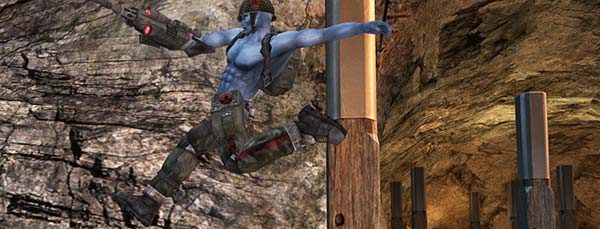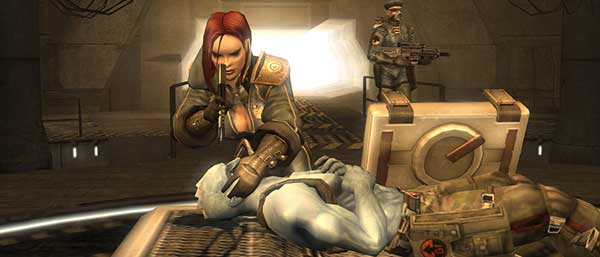Retro: Rogue Trooper
It’s Splinter Cell if Sam Fisher wasn’t such a gigantic pussy. Escape From Butcher Bay if Riddick was more than a shiv-wielding, growly thug. Gears of War with something like brains. Metal Gear Solid, as written by someone with a mental age of more than 14. Call of Duty: Far Future Warfare. So: why wasn’t 2006 tacticalish shooter Rogue Trooper massive?

Some games just fall through the cracks – they don’t pick up the hype, the marketing doesn’t resonate with the general public, the press don’t make enough bally-hoo about it because they’re too distracted by bigger names, the developer’s saddled with a bad rep from an older project... You name it, Rogue Trooper suffered it. It is no modern classic – I remember talking to Kieron at the time about how it was an on-the-nose 80% game, score-wise, and how sometimes those games can be the most fun you’ll have all year – but similarly Splinter Call, Call of Duty et al don’t exactly re-write their genres’ rulebook. They just do it really, really well.
Rogue Trooper should have been massive. That it sunk almost without trace was perhaps more responsible for its developers Rebellion since tumbling into a profitable but unimpressive loop of licensed handheld drek than was the commercial and critical failure of Dredd vs Death.
There’s a real sense of intent to Rogue Trooper, an obvious desire to get it right after screwing up Dredd. It seems absolutely sure what it wants to be, and unlike the woeful decision to unncessarily lumber Dredd with supernatural elements rather than focus on getting his Megacity right, it strips Rogue Trooper’s story and world down to the bone. Only the bare essentials are included, thus creating a self-contained tale that both introduces a long-standing 2000AD character to new players and offers a sort of Greatest Hits summation to existing fans.
Rogue: a genetically-engineered clone soldier, fighting in a bitter civil war in the far-flung future. He’s betrayed, his clone-bothers killed as a result of their general’s traitorousness. Their digitally-preserved personalities are installed into his equipment to augment his own abilities. He wants revenge. And that’s it. No flab, no flights of fancy, no dicking around: this is a straight to the point action game.
The cutscenes, dialogue and acting are all bland and forgettable, but so knowingly only there to propel the game along rather than control it. The narrative doesn’t overstay its welcome, but relies on the game-world itself to tell the bulk of the tale. Again, there’s nothing solid-gold classic about it, but it does have a lesson of sorts to teach all those shooters that get too lost in their own plotting. There really are better ways to tell a tale in a videogame.
What RT also gets right is its playable character, who hits a perfect balance between bullet-proof and fragile. Sometimes, you wonder how Sam Fisher ever got his job and what the point of that funky outfit it is given how easily he falls over, while on the other hand Gordon Freeman can absorb an awful lot of high-calibre rounds for a nerd in a spacesuit. Blue-skinned hard-nut Rogue is right in the middle, able to survive a few shots to the head but reliant on his toolbox full of stealth gadgets (a holo-ghost of himself! Turning his gun into an auto-turret!) and grenades if he wants to survive big firefights. He’s a genetically-engineered soldier – not superhuman, but certainly more than human, and controlling him really does feel like that. It’s a game you can fair blitz through so long as you’re just vaguely careful (and aren’t playing on the highest difficulty), and it’s all the more gallivanting fun for it.
RT’s also cheerfully non-didactic about your means of progress, regardless of its being a linear shooter. You can be stealth guy, or sniper-bastard, or all-out grenade-lobbing, shotgun-weilding psycho bloke or a merry mix of the bunch. You’re not penalised for however you do it, and it’s a far more meaningful freedom than go down the left road or OR! the right road.
Even ammo is unbound from what your enemies happen to drop or the environment happens to have to offer. You make it yourself, out of junk collected from corpses or random piles, and your AI-controlled backpack (named, by an astonishing coincidence, Bagman. Gunnar and Helm sure were lucky they ended up installed into a rifle and hat respectively, eh?) will process it into ammo, grenades or upgrades of your choice.
Sure, there’s generally such a surfeit of junk that resource-management isn’t all that much of an issue, but it totally rules out the usual impasse of “better save these sniper rounds – Grud knows when I’ll happen to stumble across some more.” You make what you want to use, and you make it wherever and whenever you want. Rogue Trooper is a fixed-structure game than nonetheless yields to how you want to play it, and to what you’re most enjoying. It's astonishing how few other shooters have employed similar systems: we still seem stuck with the age-old Doom model of ammo-pack collection.
Oh, and it's got co-op too, which I've yet to have the chance to try but am enormously keen to. Time to persuade the other RPS chaps to pick it up, I rather think.
Rogue Trooper is a rare thing: an action game that knows exactly what it’s doing. It should have been massive, and Rebellion should have still been making incredible games today as a result. A lot of people should be deeply ashamed that this wasn’t a success. Why not atone for their sins, and grab its ludicrously cheap $9/£6 Steam version?





